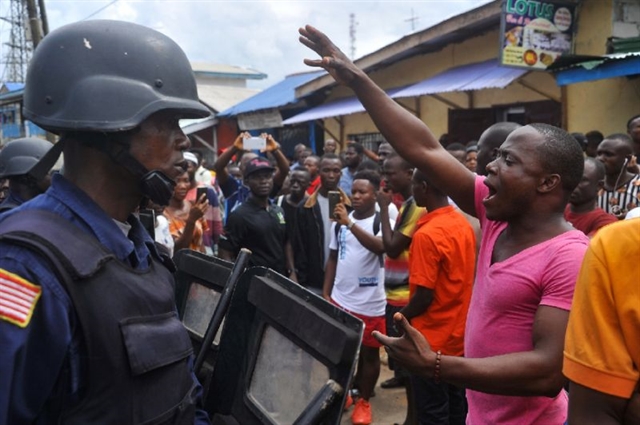 World
World


|
| Anti-government protesters confronted police on Wednesday ahead of the demonstration. — AFP Photo |
MONROVIA — Liberian President George Weah faces a key test on Friday when demonstrators take to the streets of Monrovia to protest at inflation and corruption.
The nation's football icon is being challenged over the same issues on which he campaigned in his historic ascent to the presidency, just 18 months ago.
Thousands of demonstrators are expected in the capital of the impoverished West African state. Many Liberians are bracing for a possibly violent showdown with police or prolonged disruption.
The protest coalition, calling itself the Council of Patriots, comprises politicians, professions, students and ordinary members of the public.
"We will remain in the streets until our demands are addressed... We will not leave the streets until we get results," said one of its leaders, talk-show host Henry Costa.
The UN's special envoy to West Africa and the Sahel, Mohammed Ibn Chambas, said last month he feared the authorities did not have the means to successfully manage large-scale protests.
"The capacity of the Liberian state is still quite limited... There are serious logistics and financial challenges," he told a local daily.
Samantha Wongbay, a 35-year-old mother-of-three, was among those on Thursday who were stocking up ahead of the demo.
"I came to the market to get some food provisions for the family for at least seven days, because the way this protest news is going we don't know how long it will go on for," she said.
Weah's woes
Weah, 52, is revered in Liberia and beyond for blazing a trail for African footballers in Europe.
But he is struggling to revive a country that is one of the poorest in the world and still traumatised by civil wars between 1989 and 2003 that claimed a quarter of a million lives.
Rising prices are a major source of discontent.
"Before, 500 LD (500 Liberian dollars -- $2.5, 2.3 euros) was enough to adequately feed my family each day," said Angeline Flomo, a 35-year-old housewife and mother-of-four.
"Now, 1,000 LD can't feed us. This is how bad things have become. A bag of 25 kilos of rice used to sell for 1,500 LD, now it is 2,800 to 3,000 LD. We are finding it difficult to make ends meet."
Amadu Sheriff, 43, a wholesaler, said the Liberian dollar's slump against the greenback had pushed the cost of imports ever higher.
"The rate has climbed from 120 LD to 190 LD to one United States dollar today -- if you urgently need the US dollars you have to offer up to 200 LD for one US dollar," Sheriff said.
Blame
Fingers are being pointed at the past and present managers of the Central Bank of Liberia (CBL) for its handling of the currency.
Last October, rumours swirled that newly-printed Liberian dollars worth US$102 million, intended for the CBL's reserves, had disappeared shortly after arrival from abroad.
Charles Sirleaf -- the son of former president and Nobel laureate Ellen Johnson Sirleaf -- was detained in March along with two other CBL figures.
An independent probe found no money was missing, but raised "concerns regarding the overall accuracy and completeness of the CBL's internal records."
More irregularities came come to light related to a cash injection of $25 million that Weah ordered in July 2018 to mop up excess Liberian dollars and bring inflation under control.
Last week, Weah announced the CBL's executive executive governor, Nathaniel Patray, who was appointed last July, would retire within the next three months.
His deputy for economic policy, Mounir Siaplay, quit with immediate effect, Weah said.
Weah says he is aware of the burden of ordinary people, and improvement to health, education and roads remain his priorities.
He maintains the country will benefit from an aid programme by the International Monetary Fund -- but experts say IMF support typically comes with demands for reform and belt-tightening. — AFP




